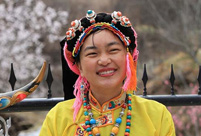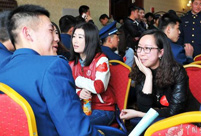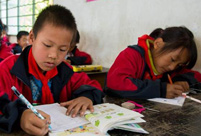BEIJING, April 2 -- Chinese President Xi Jinping's just-concluded visit to four European countries has been lauded by world media and scholars as significant in building China-Europe ties.
AFP said Xi's visit set a "landmark" in EU-China ties.
"In the run-up to the historic visit, both sides expressed the need for deeper bonds between peoples that make up a quarter of the world's population and represent a third of the world economy," AFP said.
The visit "shows that China's foreign policy remains mindful of Europe and interested in pursuing greater integration with the Europeans," Patrick Nijs, former Belgian ambassador to China, was quoted as saying.
Augusto Soto, a professor of Spain's ESADE Business School, said Xi broached many new proposals in speeches during his tour, including building four "bridges" of peace, growth, reform and progress of civilization to step up friendship and cooperation between China and the EU.
He said the proposal would unquestionably advance the all-round China-EU partnership of friendship and cooperation, and be conducive to establishing a multi-polarized world.
Richard Trappl, director of the Confucius Institute at the University of Vienna, said Xi's visit to the EU headquarters, Europe's highest institution, signaled China and European countries were nurturing favorable ties.
Europe should grasp the outstretched hand of China for common interests as well as for tackling pressing global issues. Trappl said.
Germany's Handelsblatt newspaper said Xi's tour was his first visit to Europe as Chinese president.
He was warmly received wherever he went and, as the leader of the world's fast-growing economy, Xi showed confidence and brought to Europe economic cooperation pacts and prospects for deepening partnership and cooperation.
The Diplomat, a Japanese foreign affairs magazine, said Xi's visit reflected a new Chinese determination to actively cultivate ties with European countries.
The major focus was on trade and the trip fit China's general foreign policy strategy of increasing economic integration worldwide, the Diplomat reported.
Independent online newspaper EUobserver said, if the EU wanted to take bilateral relations to the next level, a free trade agreement (FTA) would dramatically deepen ties between two of the world's largest markets.
An extensive trade pact would certainly increase the interdependence of the two blocs and potentially reduce the risk of new trade disputes, it said.
French Senator Jean-Pierre Raffarin said President Xi's speech last week to UNESCO was of some magnitude.
The president had developed very strong ideas in the speech: firstly it was very important to say that no civilization was superior to another. Second, the president developed in his speech the idea of associating the material and the spiritual in the civilizing ambition, he said.
Xi's speech at the College of Europe in Bruges, the world's oldest university of postgraduate studies on Europe, was highly remarkable, said Francesca Manenti, Asian affairs analyst with the Rome-based Center for International Studies (CeSI).
"He devoted much of his speech at the College of Europe to elaborating Chinese civilization and explain how ancient and wide Chinese history, tradition, and culture are," Manenti said.
"I don't think it was a random choice, because understanding the ancient Chinese civilization is a way to understand what China is today and why the country claims its rights and asks for mutual respect within the international community." From this point of view, the analyst said, the Chinese president showed a long-term perspective of the EU-China relationship.
Xulio Rios, director of the Observatory of Chinese Politics in Spain, said Xi's trip to Europe highlighted China's interest in transformation, based on two main factors: one, civilization; two, profound reforms and changes.
Sico van der Meer, an expert with the Clingendael Institute of International Relations, a Dutch think-tank based in the Hague, said Xi's appeal at the third Nuclear Security Summit (NSS), including improving coordination between the relevant multilateral mechanisms and initiatives and effectively eliminating risks of nuclear security and nuclear proliferation, showed a big power's responsibility.
Former Arab League ambassador to China Abdel Wahab El-Saket said Xi's address to the Korber Foundation in Germany showed the Chinese people loved peace and opposed war.
China played an important role in safeguarding world peace and stability, he said.
David Fouquet, researcher at the European Institute for Asian Studies, said he felt enlightened by Xi's speech at the College of Europe.
Chinese leaders' attention to cultural exchanges consolidated the basic foundation of EU-China ties, he said.
This would lead EU and European leaders to look at China from a cultural perspective and develop ties with China from people-to-people exchanges, Fouquet said.
During the March 22-April 1 trip, Xi attended the third Nuclear Security Summit in The Hague, and paid state visits to the Netherlands, France, Germany and Belgium.
He also visited the headquarters of the United Nations Educational, Scientific and Cultural Organization in Paris and the EU headquarters in Brussels.
 Wonderful moment of China's airborne forces
Wonderful moment of China's airborne forces Bai Baihe shoots for fashion magazine
Bai Baihe shoots for fashion magazine Red terraced fields in Dongchuan of Yunnan
Red terraced fields in Dongchuan of Yunnan Jiaju Tibetan Village
Jiaju Tibetan Village Spring dating
Spring dating Confucius institute at UC Davis
Confucius institute at UC Davis Little painted faces at temple fair
Little painted faces at temple fair Top 10 safest airlines in the world
Top 10 safest airlines in the world Foreign students at China-Myanmar border
Foreign students at China-Myanmar border Ballerinas anywhere but onstage
Ballerinas anywhere but onstage Most unusual taxis around the world
Most unusual taxis around the world Micro-expression at 'two sessions'
Micro-expression at 'two sessions' Bridge Worship Festival in Taijiang, SW China
Bridge Worship Festival in Taijiang, SW China Hollywood documentary brings Diaoyu Islands truth to new audience
Hollywood documentary brings Diaoyu Islands truth to new audience Miss HK and actresses shine at flower show
Miss HK and actresses shine at flower showDay|Week|Month